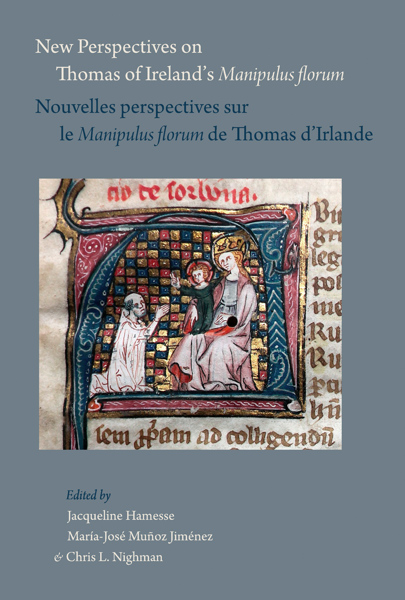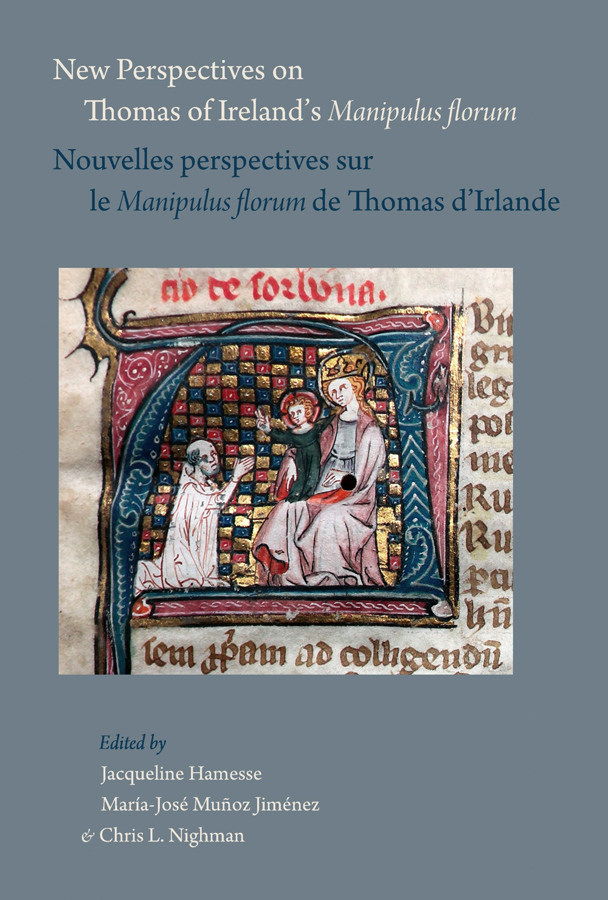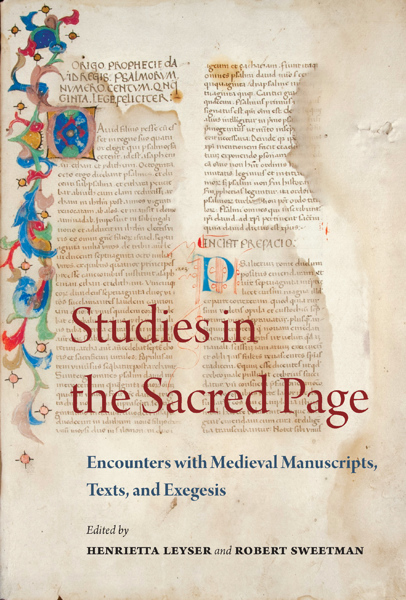
New Perspectives on Thomas of Ireland’s Manipulus florum / Nouvelles perspectives sur le Manipulus florum de Thomas d’Irlande
Jacqueline Hamesse, María José Muñoz, Chris L. Nighman
- Pages: ix + 254 p.
- Size:152 x 229 mm
- Language(s):English, French
- Publication Year:2020
- € 90,00 EXCL. VAT RETAIL PRICE
- ISBN: 978-0-88844-832-3
- Hardback
- Available
“This collection, growing out of an international colloquium on the Manipulus florum held at Wilfrid Laurier University in 2014, carries forward the research on Thomas of Ireland’s florilegium initiated by Richard and Mary Rouse in their path-breaking study published by the Pontifical Institute of Mediaeval Studies in 1979. The essays gathered here illustrate just how far studies of Thomas and his Manipulus have come in those forty years. Building on the excellent electronic edition of the text by Chris Nighman, the authors pursue a diversity of approaches to engage with Thomas’s compendium. Together, these papers reveal the remarkable riches this seemingly ‘common, everyday handbook,’ which in the Rouses’ description ‘contains no original thought and makes no intellectual pretensions,’ holds for the intellectual history of the middle ages.” — Joseph Goering, University of Toronto
The ten essays that make up this collection join the tradition of studies on the Manipulus florum inaugurated by Richard and Mary Rouse with their Preachers, Florilegia and Sermons, published by the Institute in 1979, and include close analyses of specific lemmata as well as broader studies that should appeal to students and scholars in various fields.
The study of Latin florilegia has gathered considerable momentum in recent years driven, in part, by the “New Philology,” a theoretical approach to manuscript scholarship that regards textual variants not as corruptions of the original text, but as “authentic witnesses” in their own right. This growing emphasis on textual traditions is directly relevant to medieval florilegia, handy reference works that were widely employed prior to the twentieth century by writers of both vernacular and Latin texts to find eloquent, authoritative quotations from venerable authors. Although these collections of classical, patristic, and medieval quotations are by their nature derivative, they are increasingly recognized as valuable witnesses to historical mentalités. The selection and organization of these textual fragments not only reflects the intellectual milieux of their compilers, but also influenced later intellectual contexts.
No example of the genre perhaps better demonstrates these claims than the Manipulus florum of Thomas of Ireland. Composed in 1306, this florilegium comprises nearly six thousand excerpts, organized under 266 alphabetically ordered lemmata, from dozens of authors, including doctors and fathers of the Latin and Greek churches, medieval writers, and classical authors. One of the most prominent works of reference from its creation until the seventeenth century, it remains of interest to philologists, philosophers, and historians not only of the medieval world, but also, given its wide diffusion and reception, of the Renaissance and of humanism.
Acknowledgments • vii
Abbreviations • ix
Introduction (en français and in English) • MARÍA-JOSÉ MUÑOZ JIMÉNEZ
1 Revisiting John of Wales’s Role in the Creation of the Manipulus florum • CHRIS L. NIGHMAN
2 The Manipulus florum of Thomas of Ireland and the Glossed Bible • MARK ZIER
3 Quels mots pour exprimer l’émotion dans le Manipulus florum? Ce qu’ils nous disent sur son public et sa fonction • XAVIER BIRON-OUELLET
4 Patience in the Manipulus florum • ROBIN WAUGH
5 Âme et corps dans le Manipulus florum de Thomas d’Irlande • IOLANDA VENTURA
6 Thomas of Ireland’s Construction of Angelus and Diabolus and the Usefulness of His Manipulus florum • LOUIS SHWARTZ
7 From the University to the Cloister: The Manipulus florum and William of Pagula’s Speculum religiosorum • TRISTAN SHARP
8 The Lemmata Amor, Caritas, and Dilectio in Thomas of Ireland’s Manipulus florum and Their Influence on Renaissance Mysticism • ALAN VINCELETTE
9 What a Calvinist Edition of the Manipulus florum Provided to French Protestants: A Reading of the Lemma Ecclesia in Jacob Stoer’s 1593 Edition • NICHOLAS MUST
10 Les manuscrits du Manipulus florum conservés dans les bibliothèques espagnoles • MARÍA-JOSÉ MUÑOZ JIMÉNEZ
Bibliography
Contributors
Index of Classical, Patristic, and Medieval Authors
Index of Citations of the Manipulus florum


